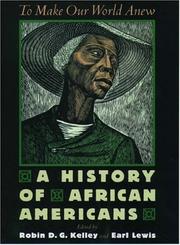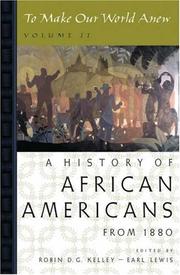| Listing 1 - 10 of 14 | << page >> |
Sort by
|
Book
ISBN: 0520066448 Year: 1991 Publisher: Berkeley Los Angeles Oxford University of California Press
Abstract | Keywords | Export | Availability | Bookmark
 Loading...
Loading...Choose an application
- Reference Manager
- EndNote
- RefWorks (Direct export to RefWorks)

ISBN: 9780316525589 Year: 2004 Publisher: London Time Warner
Abstract | Keywords | Export | Availability | Bookmark
 Loading...
Loading...Choose an application
- Reference Manager
- EndNote
- RefWorks (Direct export to RefWorks)
Als je veel haar hebt en je mama moet het stevig kammen dan kan het wel pijn doen. Als kind vind je dat niet fijn tot mama je vertelt hoe mooi je wel bent met je haar. Zwart kroezelhaar dat je op zoveel verschillende manieren kan kammen. Mensen kijken naar je omdat je vlechtjes mee dansen als je over straat huppelt of geven je het gevoel dat je kan vliegen! Een vrolijk boek over het haar van een zwart meisje.
Book
ISBN: 1280845430 9786610845439 0198040067 9780198040064 0199839824 Year: 2005 Publisher: New York : Oxford University Press,
Abstract | Keywords | Export | Availability | Bookmark
 Loading...
Loading...Choose an application
- Reference Manager
- EndNote
- RefWorks (Direct export to RefWorks)
The two volumes of Kelley and Lewis's To Make Our World Anew integrate the work of eleven leading historians into the most up-to-date and comprehensive account available of African American history, from the first Africans brought as slaves into the Americas, right up to today's black filmmakers and politicians. This first volume begins with the story of Africa and its origins, then presents an overview of the Atlantic slave trade, and the forced migration and enslavement of between ten and twenty million people. It covers the Haitian Revolution, which ended victoriously in 1804 with the birth
African Americans --- Black history --- History. --- United States --- African Americans history --- history

ISBN: 0195139453 Year: 2000 Publisher: Oxford ; New York : Oxford University Press,
Abstract | Keywords | Export | Availability | Bookmark
 Loading...
Loading...Choose an application
- Reference Manager
- EndNote
- RefWorks (Direct export to RefWorks)
African Americans --- Noirs américains --- History. --- Histoire

ISBN: 0199839018 1283098261 9786613098269 0199838933 9780199838936 0195181352 9780195181357 Year: 2005 Publisher: Oxford ; New York : Oxford University Press,
Abstract | Keywords | Export | Availability | Bookmark
 Loading...
Loading...Choose an application
- Reference Manager
- EndNote
- RefWorks (Direct export to RefWorks)
The two volumes of Kelley and Lewis's To Make Our World Anew integrate the work of eleven leading historians into the most up-to-date and comprehensive account available of African American history, from the first Africans brought as slaves into the Americas, right up to today's black filmmakers and politicians. This second volume covers the crucial post-Reconstruction years and traces the migration of blacks to the major cities. It describes the remarkable birth of the Harlem Renaissance, the hardships of the Great Depression, and the service of African Americans in World War II. Readers with
African Americans --- Civil rights --- History.
Book
ISBN: 9782924645468 Year: 2020 Publisher: Sherbrooke, Québec : Editions D'eux,
Abstract | Keywords | Export | Availability | Bookmark
 Loading...
Loading...Choose an application
- Reference Manager
- EndNote
- RefWorks (Direct export to RefWorks)
Book

ISBN: 0691193827 Year: 2019 Publisher: Princeton, NJ : Princeton University Press,
Abstract | Keywords | Export | Availability | Bookmark
 Loading...
Loading...Choose an application
- Reference Manager
- EndNote
- RefWorks (Direct export to RefWorks)
How businesses and other organizations can improve their performance by tapping the power of differences in how people thinkWhat if workforce diversity is more than simply the right thing to do? What if it can also improve the bottom line? It can. The Diversity Bonus shows how and why. Scott Page, a leading thinker, writer, and speaker whose ideas and advice are sought after by corporations, nonprofits, universities, and governments, makes a clear and compelling practical case for diversity and inclusion. He presents overwhelming evidence that teams that include different kinds of thinkers outperform homogenous groups on complex tasks, producing what he calls "diversity bonuses." These bonuses include improved problem solving, increased innovation, and more accurate predictions-all of which lead to better results. Drawing on research in economics, psychology, computer science, and many other fields, The Diversity Bonus also tells the stories of businesses and organizations that have tapped the power of diversity to solve complex problems. The result changes the way we think about diversity at work-and far beyond.
Diversity in the workplace. --- Teams in the workplace. --- Personnel management. --- Knowledge economy. --- Accuracy and precision. --- Advertising. --- Affirmative action. --- African Americans. --- Americans. --- Analogy. --- Analytics. --- Asian Americans. --- Asset management. --- Biology. --- Board of directors. --- Boeing. --- Business case. --- Calculation. --- Career. --- Categorization. --- Causality. --- Classroom. --- Collaboration. --- Collective intelligence. --- Competition. --- Computer scientist. --- Cross-functional team. --- Customer. --- Decision-making. --- Demography. --- Economist. --- Effectiveness. --- Empirical evidence. --- Employment. --- Engineering. --- Ensemble learning. --- Entrepreneurship. --- Estimation. --- Explanation. --- Finding. --- Fluid and crystallized intelligence. --- Forecasting. --- Fortune 500. --- Gender diversity. --- Grutter v. Bollinger. --- Harvard University. --- Heuristic. --- Hidden Figures. --- Human resources. --- Income. --- Inference. --- Institution. --- Intelligence analysis. --- Intersectionality. --- Knowledge base. --- Larry Page. --- Majority minority. --- Marketing. --- Mathematician. --- Mathematics. --- Meritocracy. --- Microsoft. --- Mission statement. --- National Science Foundation. --- Netflix. --- New York University. --- Obesity. --- Organization. --- Organizational culture. --- Participant. --- Percentage. --- Philosopher. --- Political science. --- Prediction. --- Predictive modelling. --- Probability. --- Problem solving. --- Product design. --- Profession. --- Quality control. --- Quartile. --- Race (human categorization). --- Restaurant. --- Result. --- Robert Wood Johnson Foundation. --- Rule of thumb. --- Scientist. --- Sexual orientation. --- Social issue. --- Social science. --- State of the World (book series). --- Supply chain. --- Team composition. --- Technology. --- Theorem. --- Tool. --- Trade-off. --- Tradecraft. --- University of Michigan. --- Wealth. --- Weighting. --- Workforce. --- Workplace.

ISBN: 0190282266 0195087712 0199762481 Year: 1996 Publisher: Oxford University Press, Incorporated
Abstract | Keywords | Export | Availability | Bookmark
 Loading...
Loading...Choose an application
- Reference Manager
- EndNote
- RefWorks (Direct export to RefWorks)
Periodical
Publisher: Berkeley ; Los Angeles ; London University of California
Abstract | Keywords | Export | Availability | Bookmark
 Loading...
Loading...Choose an application
- Reference Manager
- EndNote
- RefWorks (Direct export to RefWorks)
Book
ISBN: 9781400888269 9780691176888 Year: 2017 Publisher: Princeton, NJ
Abstract | Keywords | Export | Availability | Bookmark
 Loading...
Loading...Choose an application
- Reference Manager
- EndNote
- RefWorks (Direct export to RefWorks)
How businesses and other organizations can improve their performance by tapping the power of differences in how people think What if workforce diversity is more than simply the right thing to do in order to make society more integrated and just? What if diversity can also improve the bottom line of businesses and other organizations facing complex challenges in the knowledge economy? It can. And The Diversity Bonus shows how and why. Scott Page, a leading thinker, writer, and speaker whose ideas and advice are sought after by corporations, nonprofits, universities, and governments around the world, makes a clear and compellingly pragmatic case for diversity and inclusion. He presents overwhelming evidence that teams that include different kinds of thinkers outperform homogenous groups on complex tasks, producing what he calls "diversity bonuses." These bonuses include improved problem solving, increased innovation, and more accurate predictions--all of which lead to better performance and results. Page shows that various types of cognitive diversity--differences in how people perceive, encode, analyze, and organize the same information and experiences--are linked to better outcomes. He then describes how these cognitive differences are influenced by other kinds of diversity, including racial and gender differences--in other words, identity diversity. Identity diversity, therefore, can also produce bonuses. Drawing on research in economics, psychology, computer science, and many other fields, The Diversity Bonus also tells the stories of people and organizations that have tapped the power of diversity to solve complex problems. And the book includes a challenging response from Katherine Phillips of the Columbia Business School. The result changes the way we think about diversity in the workplace--and far beyond it.
| Listing 1 - 10 of 14 | << page >> |
Sort by
|

 Search
Search Feedback
Feedback About UniCat
About UniCat  Help
Help News
News